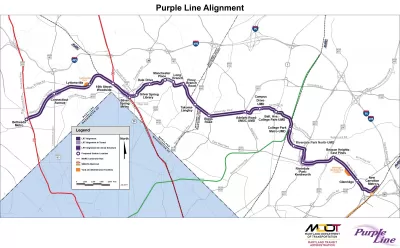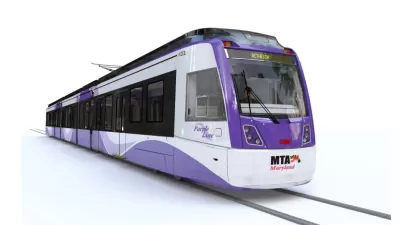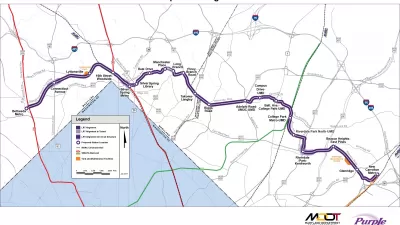The design-build team hired to build the Purple Line in Maryland could walk off the job unless a deal regarding the increasing cost of the project isn't brokered by June 20.

Back in May, the design-build consortium contracted to build the Purple Line light rail line in Maryland announced that it was planning to walk off the project in a dispute with state officials over the project's ballooning costs.
Jim Parsons reported at the time of the announcement:
Purple Line Transit Constructors (PLTP) , which includes Fluor Corp., Lane Construction Corp. and Traylor Bros. Inc, said in a May 1 statement that it has been “unable to obtain the time and cost relief to which it is entitled” from the Maryland Dept. of Transportation and the Maryland Transit Administration (MTA) to address a combination of factors that added more than a year and $500 million to the 16-mile, 21-station project across northern suburbs of Washington, D.C. that will link to existing rail lines.
In June, the threat still stands, as reported in a separate article written by Katherine Shaver on June 13. According to Shaver, industry observers are tracing the Purple Line's problems with a track record of cost overruns at Fluor Corp.
"The company’s problems include cost overruns on multiple megaprojects and a Securities and Exchange Commission investigation into whether it properly accounted for $714 million in overruns and other expenses in 2019," according to Shaver. "It’s unclear whether the SEC investigation includes the Purple Line project."
The long-disputed, long-delayed, increasingly expensive Purple Line hangs in the balance. As for what comes next, Shaver reports the following:
The three sides — the state, the construction contractor, and an umbrella group of companies overseeing a 36-year public-private partnership on the project — have until June 20 to agree on who will pay for additional costs. Unless a settlement is reached, the construction team has said it will leave in 60 to 90 days.
FULL STORY: Maryland likely to be on the hook for millions if it wants to save the Purple Line project, analysts say

Maui's Vacation Rental Debate Turns Ugly
Verbal attacks, misinformation campaigns and fistfights plague a high-stakes debate to convert thousands of vacation rentals into long-term housing.

Planetizen Federal Action Tracker
A weekly monitor of how Trump’s orders and actions are impacting planners and planning in America.

In Urban Planning, AI Prompting Could be the New Design Thinking
Creativity has long been key to great urban design. What if we see AI as our new creative partner?

King County Supportive Housing Program Offers Hope for Unhoused Residents
The county is taking a ‘Housing First’ approach that prioritizes getting people into housing, then offering wraparound supportive services.

Researchers Use AI to Get Clearer Picture of US Housing
Analysts are using artificial intelligence to supercharge their research by allowing them to comb through data faster. Though these AI tools can be error prone, they save time and housing researchers are optimistic about the future.

Making Shared Micromobility More Inclusive
Cities and shared mobility system operators can do more to include people with disabilities in planning and operations, per a new report.
Urban Design for Planners 1: Software Tools
This six-course series explores essential urban design concepts using open source software and equips planners with the tools they need to participate fully in the urban design process.
Planning for Universal Design
Learn the tools for implementing Universal Design in planning regulations.
planning NEXT
Appalachian Highlands Housing Partners
Mpact (founded as Rail~Volution)
City of Camden Redevelopment Agency
City of Astoria
City of Portland
City of Laramie




























